|
|
|
Sort Order |
|
|
|
Items / Page
|
|
|
|
|
|
|
| Srl | Item |
| 1 |
ID:
192991
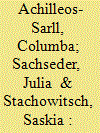

|
|
|
|
|
| Summary/Abstract |
Visuals, including photographs and data visualizations, play a crucial role in the politics of EU border security, both as an internal governance tool (e.g. in surveillance) and as an external means of communication/representation (e.g. in photojournalism). Combining scholarship on photographic representations of migration with literature on surveillance technologies and data visualizations, we argue that these visuals interact to reproduce gendered and racialized meanings of migration and border security. Using a feminist postcolonial lens, we develop an intervisual framework for studying how processes of gendering and racialization render subjects, practices and spaces knowable at the intersection between these visuals. We apply this framework to a case study of Frontex’s Risk Analysis Reports (2010–2021) and demonstrate how it is applicable to other security institutions. The intervisual analysis reveals how the migrant Other and (white) European are visually reproduced through: 1) the (in)visibilization of bodies; 2) the ascription and denial of agency; and 3) the spatialization of borders as ‘frontier imaginings’ that oscillate between fortification and expansionism. The intersectional co-constitution of gender and race, we conclude, is central to the visual politics of Frontex, contributing to problematizing migrants and migration and legitimizing violent border practices.
|
|
|
|
|
|
|
|
|
|
|
|
|
|
|
|
| 2 |
ID:
151664
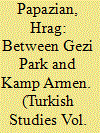

|
|
|
|
|
| Summary/Abstract |
This paper uses theories of intersectionality to study Nor Zartonk, an activist group of Istanbulite youths which is mostly comprised of Armenians. Based on ethnographic research, it first explores and analyzes the youths’ subjectivities, ideology, and activism, exposing their intersectional nature. Furthermore, through the study of this particular case the paper identifies some general potentials of intersectional positionality: first, that the politicization of one dimension of individuals’ intersectional subjectivities could pave the way for the politicization of others; second, that intersectional activists could ‘intersectionalize’ the events in which they participate, thus potentially pluralizing the socio-political implications of those; and third, that different dimensions of intersectional activism could support each other in practice and essence.
|
|
|
|
|
|
|
|
|
|
|
|
|
|
|
|
| 3 |
ID:
133826
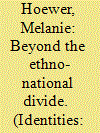

|
|
|
|
|
| Publication |
2014.
|
| Summary/Abstract |
This article examines intersecting processes of boundary formation and change during periods of conflict in Chiapas and Northern Ireland in a comparative fashion. It provides new approaches to the studies of boundaries, of intersectionality and of identity change. Looking at female activists' collective identity narratives reveals the interrelation of different processes of identity change and solidarity formation during ethno-national conflict. Those processes are determined by differences in female activists' perceptions of and positioning towards different levels of society and by spaces for bridging those boundaries. In order to enhance our understanding of ethno-national conflicts, we need to examine intersecting identity categories in relation to social change and highlight underlying and interacting processes at different levels of society that obscure and deny the existence of the gender category.
|
|
|
|
|
|
|
|
|
|
|
|
|
|
|
|
| 4 |
ID:
138943
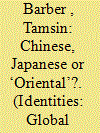

|
|
|
|
|
| Summary/Abstract |
The young British-born Vietnamese are a relatively invisible group in ‘super-diverse’ London who are often misidentified in their everyday encounters. Eluding more straightforward processes of ethnic or racial assignment, the young Vietnamese ‘pass’ in various different ways as Chinese, Japanese, Korean, Thai or ‘Oriental’. Drawing upon primary interview data and participant observation, this article traces ‘passive’ and ‘deliberate’ forms of passing to highlight how intersecting processes of class, gender and place enable/engender different kinds of passing. It is argued that Vietnamese-passing challenges more ‘celebratory’ readings of (super-) diversity by concealing (and depoliticising) difference and erasing Vietnamese voices rather than allowing for their proliferation. It is suggested that practices of passing may become more common in super-diverse societies, as markers of visible difference become increasingly complex and less determinable, especially among newer, non-colonial migrant groups who are more ambiguously positioned within existing identity regimes.
|
|
|
|
|
|
|
|
|
|
|
|
|
|
|
|
| 5 |
ID:
190100
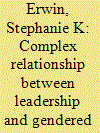

|
|
|
|
|
| Summary/Abstract |
Leadership, whether through response, composition, representation, or direction, reflects a complex relationship with gender in the military. The findings of this qualitative study highlighted the profound and complex relationship between leadership and gendered experiences within the military in a variety of facets including within various ranks, from superiors, subordinates, and peers, as well as both as and with leaders. This includes considerations, or lack thereof, for issues pertaining to representation, voice, gender bias, stereotyping, and intersectionality in addition to the significant and prominent issues of sexual misconduct. Military leadership development efforts, both at large and for women in particular, must reflect the pivotal role which leadership plays while simultaneously acknowledging the unique cultural and contextual environment of the military. In addition to continued efforts to encourage and enable women’s military service and leadership, military and civilian leadership, regardless of gender, should be cognizant of the magnitude of leader roles and responsibilities pertaining to gender.
|
|
|
|
|
|
|
|
|
|
|
|
|
|
|
|
| 6 |
ID:
141466
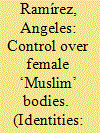

|
|
|
|
|
| Summary/Abstract |
Control of the female body is a key component of both the formation of Muslim identities and the control of Muslim communities in European countries. I will argue that the regulation of the clothing worn by Muslim women, both the restriction of its use (which occurs mainly in non-Muslim countries) and the requirement to wear a particular item, share the same goal: the control of women’s bodies. In this respect, I will consider both the legal regulations that require women to wear the so-called ‘Muslim’ clothing and those that restrict it as a way of disciplining the population, and will focus on the control of women as a privileged form of political control.
|
|
|
|
|
|
|
|
|
|
|
|
|
|
|
|
| 7 |
ID:
143653
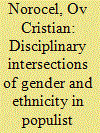

|
|
|
|
|
| Summary/Abstract |
The present study examines how the desirable ideals of femininity for the ethno-nationalist project are framed in populist radical right media in contemporary Romania. The study examines the editorials of populist radical right party leader (Corneliu Vadim Tudor) published at election times between 2000 and 2012 in the weekly party publication. It explores the inventory of media frames, which provide the panopticon of femininity performances coming forth in Tudor’s editorials, and the disciplining endeavours these depictions enable. In the first step, the femininity performance of Romanian women seen as nationalist ideal of submission and childbearing is juxtaposed with the portrayal of women who forsake such expectations, and that of Roma women described as promiscuous and overly fertile. In the second step, the roles afforded to women in the public arena are evidenced, either as selfless heroines or their antithetic depiction, the power-hungry women.
|
|
|
|
|
|
|
|
|
|
|
|
|
|
|
|
| 8 |
ID:
175157
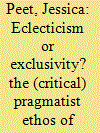

|
|
|
|
|
| Summary/Abstract |
Eclecticism in International Relations (IR) claims to reject the rigid boundaries set by various theoretical traditions, yet, in practice, it falls short of moving the field “beyond paradigms” and tends to produce analytical exclusivity rather than eclecticism. This exclusivity is the result of Sil and Katzenstein’s investment in tenets of American pragmatism. These tenets favor consensus and universalism, leading to the reproduction and exclusivity of the theoretical status quo. Dissolving paradigmatic boundaries requires a more critical form of pragmatism. Drawing on the common origins of feminism and pragmatism paired with the contemporary feminist concept of intersectionality, this essay proposes a critical pragmatist ethos and an intersectional analytic eclecticism. This can produce a more inclusive form of analytic eclecticism and render visible the power dynamics that shape experiences as well as academic scholarship. Only when analytic eclecticism is informed by intersectionality and a critical pragmatism might it actually move IR “beyond paradigms.”
|
|
|
|
|
|
|
|
|
|
|
|
|
|
|
|
| 9 |
ID:
177893
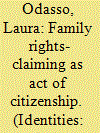

|
|
|
|
|
| Summary/Abstract |
Ethnographic and biographical research conducted with mixed-status couples and non-governmental organisations in France and Belgium provides insights into how the citizen partners of mixed-status relationships define and assert their family rights. In response to injustices suffered, from the state or from the migrant (non-citizen) partner, these citizens turned to organisations with contrasting discourses on marriage migration. These organisations encouraged them to participate in collective actions, and to give voice to their intimate experiences. Drawing on accounts of ‘intimate citizenship’, this article explores the citizenship-belonging nexus through lenses of performativity and intersectionality. Gender and ethnicity interact to influence interactions between citizen partners and the state, the tension between their virtual and actual social identities, and – ultimately – their assertions of citizenship, with personal status underpinning public claims. By speaking and acting in the name of their private lives and choices, these citizen partners affirm their (intimate) citizenship through its public performance.
|
|
|
|
|
|
|
|
|
|
|
|
|
|
|
|
| 10 |
ID:
089195
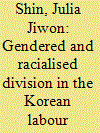

|
|
|
|
|
| Publication |
2009.
|
| Summary/Abstract |
Based on the empirical analysis of migrant women employed in the catering sector, this paper examines the gendered and racialised division in the Korean labour market. Given limited labour protection and the flexibilisation of the migrant workforce in the labour market, South Korea has been able to reduce possible economic and social costs and, at the same time, enjoy the benefits of the significant economic contribution of migrant workers. By looking at gender relations and racial discrimination in the catering sector, and inconsistent government policies, this paper underlines that migrant women are marginalised in the labour market owing to their 'multiple vulnerability' as women, migrants and undocumented workers.
|
|
|
|
|
|
|
|
|
|
|
|
|
|
|
|
| 11 |
ID:
085867
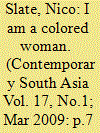

|
|
|
|
|
| Publication |
2009.
|
| Summary/Abstract |
In the midst of the Second World War, feminist, socialist, and anti-colonial activist Kamaladevi Chattopadhyaya spent 18 months travelling and speaking in the United States. She aimed to increase American support for Indian independence, while establishing connections with American feminists and African Americans, and defending the rights of women and people of colour throughout the world. Kamaladevi championed a coloured cosmopolitanism that defied narrow, chauvinist definitions of race, religion, or nation, while simultaneously encouraging the unity of 'coloured' peoples. She envisioned Indian independence as a crucial step toward the liberation of the entire 'coloured world'. By sharing her expansive understanding of coloured solidarity with her Indian readers, Kamaladevi contributed to the knowledge and persistence with which Indians criticized American racism. India's independence, coupled with the rise of the Cold War, endowed Indian criticism of American racial oppression with new power. Beginning in the late 1940s, Indian opinion helped pressure American presidents, Supreme Court justices, and diplomatic officials, afraid of losing the propaganda battle of the Cold War, to resolve civil rights crises and to instigate significant domestic reforms. Tracing the genesis and impact of Kamaladevi's coloured cosmopolitanism reveals the long and diverse history of Indian critiques of American racism.
|
|
|
|
|
|
|
|
|
|
|
|
|
|
|
|
| 12 |
ID:
143649
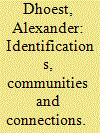

|
|
|
|
|
| Summary/Abstract |
This paper explores sexual and ethnic-cultural identifications among first- and second-generation gay migrants in Belgium. Based on a theoretical framework highlighting the multiple, fluid and intersectional nature of identifications, 29 in-depth interviews are used to study self-identifications and connections to different communities. Drawing on a diverse sample, three clusters of participants can be distinguished: second-generation migrants, who were born in Belgium; sexual refugees, who escaped to Belgium; and voluntary migrants, who chose to move to Belgium. Ethnic-cultural and sexual identifications interact and vary between these groups of participants, but also within them as they intersect with other social positionings such as class, gender and race.
|
|
|
|
|
|
|
|
|
|
|
|
|
|
|
|
| 13 |
ID:
192966
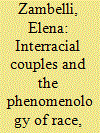

|
|
|
|
|
| Summary/Abstract |
Drawing from ethnographic research in England, this article discusses interracial, Black-white couples’ perceptions and experiences of racism and racial discrimination. Empirically, it enlarges scholarship’s prevailing focus on the effects of anti-Black racism on their social worlds, to an exploration of the relationship between race, place and space. More specifically, it discusses how partners’ differently racialised and gendered subjectivities impact their perceptions of being or not the object of interracial couple-based discrimination in public spaces, their residential choices, and their selection of leisure travel destinations. Use of an intersectional lens and the inclusion of both opposite- and same-sex couples contribute to mitigating the currently underexplored role of social class and sexuality in the shaping of interracial couples’ everyday lives. Theoretically, the article contributes to the study of whiteness as habitus and phenomenology: focusing in particular on how race mediates partners’ spatialised perceptions of dis/comfort and un/safety.
|
|
|
|
|
|
|
|
|
|
|
|
|
|
|
|
| 14 |
ID:
189910
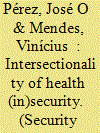

|
|
|
|
|
| Summary/Abstract |
Brazil has suffered severe consequences from the Covid-19 pandemic, currently ranking second globally in terms of total fatalities, with more than 682,000 lives lost. This article critically outlines how a ‘health security’ framework overlooks processes of intersectionality and the varying impacts of the virus on different segments of society, or what we term health insecurity. We organize our analysis around three aspects of the pandemic that have become salient in Brazilian society, namely access to healthcare, disposable workers, and exposure to the virus, and delineate the intersectional impact of gendered inequality, neoliberal ideologies, and racial hierarchies within these three themes. Our methodology employs media and scholarly interpretations of Covid-19, and other secondary empirical and statistical data, to outline the virus’s impacts on differently positioned bodies throughout Brazilian society. Our main findings reveal that during the pandemic, women’s labor and health concerns have been undervalued, exploitative working conditions have been exacerbated, and Afro-Brazilians have been put in situations of higher exposure to the virus in both public and private spaces. This article underscores the need to better examine how public health, systems of oppression and exclusion, and (in)security overlap with each other.
|
|
|
|
|
|
|
|
|
|
|
|
|
|
|
|
| 15 |
ID:
110547
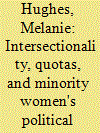

|
|
|
|
|
| Publication |
2011.
|
| Summary/Abstract |
The majority of the world's countries have implemented policies designed to advance the political representation of women and/or minority groups. Yet we do not yet understand how these disparate policies affect the election of minority women. In this article, I draw on theories of intersectionality to conduct the first worldwide analysis of the effects of gender and minority quotas on minority women's representation in national legislatures. Using hierarchical linear modeling, I analyze how quotas influence the election of women from more than 300 racial, ethnic, and religious groups across 81 countries. I find that policies designed to promote the political representation of women and minority groups interact to produce diverse but predictable outcomes for minority women. Although quotas are ostensibly designed to promote diversity and inclusiveness, the quota policies in effect today rarely challenge majority men's dominance of national legislatures.
|
|
|
|
|
|
|
|
|
|
|
|
|
|
|
|
| 16 |
ID:
194511


|
|
|
|
|
| Summary/Abstract |
Microaggression has recently gained prominence. It is a psychological construct that examines everyday slights experienced by marginalized groups. While much of the research has stemmed from the United States and has focused on race, gender, and sexuality, very few studies have investigated ways in which complex and overlapping identities involving language, religion, and caste/class intersect in cross-cultural workplace settings in the Global South. This study fills this gap by exploring a minoritized group carrying a ‘double discrimination’ burden due to their religion and socio-economic historical class background. It examines in what ways, if any, Indian Meos experience microaggressions in cross-cultural workplace settings. In doing so, it extends research that remains understudied. One of the criticisms against microaggression studies is their reliance on self-reporting and recall of past instances, thus lacking validity. This paper proposes conversation analysis as a useful approach offering an empirically grounded analysis of microaggression in action.
|
|
|
|
|
|
|
|
|
|
|
|
|
|
|
|
| 17 |
ID:
173207
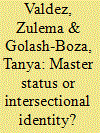

|
|
|
|
|
| Summary/Abstract |
Research on undocumented students in the United States often focuses on the challenges they face navigating postsecondary education, rooted in their precarious legal status. The observed influence of legal status on undocumented students’ sense of belonging and academic progress provides compelling evidence that being undocumented functions as a master status – a salient identity that conditions students’ educational incorporation. Yet, this research tends to highlight legal status while deemphasizing or excluding other identities. Our study takes an intersectional approach. Using focus group data with undocumented students at a Hispanic-Serving Institution, we show that students rarely identify legal status in isolation or implicate it as the sole source of adversity. Instead, students’ reveal a sense of belonging rooted in multiple dimensions of identity including ethnicity and class. This study reconsiders the utility of the master status concept in favour of an intersectional one for a comprehensive picture of undocumented students’ educational incorporation.
|
|
|
|
|
|
|
|
|
|
|
|
|
|
|
|
| 18 |
ID:
141469
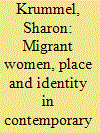

|
|
|
|
|
| Summary/Abstract |
While recent scholarship on migration has reflected growing attention to gender and to the intersectionality of race, gender and sexuality, there has been little focus on women’s emotional and bodily responses to migration in the context of larger structures of sexism, racism and the legacies of colonialism. In this paper, I examine some literary portrayals of how migrant women’s relationships with specific places of origin and settlement, both steeped in structural relationships of unequal power and experienced on an immediate, psychological and bodily plane, are fundamental to migrant women’s changing sense of belonging and identity. Jamaica Kincaid in her novel Lucy, Tsitsi Dangarembga in her novel Nervous Conditions and Dionne Brand in the opening poems of her volume No Language is Neutral evoke some of the complex ways in which migration can affect women’s lives and identities, thus both complementing and critiquing some contemporary theorisations of migration and migrant identities.
|
|
|
|
|
|
|
|
|
|
|
|
|
|
|
|
| 19 |
ID:
141470
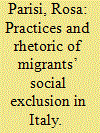

|
|
|
|
|
| Summary/Abstract |
The article aims to investigate the intersection of legislative dimensions, economic conditions and intimate life contributing to racialising and marginalising the poorest non-European migrants. First, this article focuses on the central role played by the private life in claiming citizenship rights and in building a sense of belonging within migratory contexts. As a result, mixed couples become a border zone through which the state disciplines immigrants according to their class, nationality and gender. On the other side, mixed couples and their intimate lives define resistance against the state’s biopolitical power to control people and become the space of intimate citizenship. Second, the article analyses the matrix for immigrants’ exclusion and differentiation embodied within the institutional and legislative system through immigration and citizenship laws. Therefore, the ‘coloniality power matrix’ becomes an active component of the naturalisation system of social differences at an institutional level.
|
|
|
|
|
|
|
|
|
|
|
|
|
|
|
|
| 20 |
ID:
141464
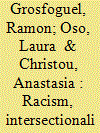

|
|
|
|
|
| Summary/Abstract |
The concept of ‘racism’ has faced many difficulties in migration studies. Depending on definitions, islamophobia is a form either of religious discrimination or of racism. The same is true in contemporary debates in Europe about xenophobia against immigrants from the Global South. This article provides an alternative way of thinking about racism and its relationship with questions of intersectionality and discusses the relationship of these issues to migration theory. In the first part, we discuss intersectionality in relation to Fanon’s definition of racism. Then, we establish a dialogue between the work of de Sousa Santos and Fanon that could enrich our understanding of intersectionality in the framework of modernity and the capitalist/imperial/patriarchal/racial colonial world-system. Finally, we analyse this discussion’s implications for migration theory, highlighting how migration studies tend to reproduce a northern-centric social science view of the world that comes from the experience of others in the zone of being.
|
|
|
|
|
|
|
|
|
|
|
|
|
|
|
|
|
|
|
|
|